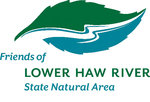

Gretchen Smith moved to Chatham County in 1985 as a lover of nature and volunteering. More than 30 years later, she’s managed to bring together those two passions across multiple conservation groups in Chatham through her environmental advocacy for the Haw River, helping to secure grants to improve public access points and spearheading campaigns for trail infrastructure projects.
Now, for her dedication to protecting the Haw River corridor, Smith is being honored as Public Lands Conservationist of the Year by the North Carolina Wildlife Federation.
Smith, 70, is one of 19 recipients of the federation’s annual Governor’s Conservation Achievement Awards. The awards honor conservation leaders across North Carolina who have displayed an “unwavering” commitment to the state’s wildlife, habitat and natural resources, according to the federation’s website.
This year marks the 58th such celebration held by the federation.
Smith, who is closing out her third term as president of the all-volunteer group Friends of Lower Haw River State Natural Area, was “stunned” to receive the call notifying her she’d been nominated for the award — though, if you ask her colleagues, it seems like she’s the only one who’s surprised.
“I had no idea that I had been nominated for this award,” Smith said. “And I just really feel like it’s a great honor to receive it.”
For the past 15 years, Smith has been deeply involved in conservation work in the county, first as a volunteer with the Chatham Conservation Partnership (CCP). The CCP is a collaboration between individuals, local, state and federal government groups, businesses, nonprofits, and other entities with the goal of developing strategies to protect and build awareness for the county’s natural resources.
What sets Smith apart from many of her fellow Governor’s Conservation Achievement awardees is that her conservationist career is entirely rooted in volunteerism.
This background is part of the impetus for an initiative she began while working with CCP.
“I’m not a biologist or an ecologist or a geologist, or anything like that,” Smith, who worked in health administration with UNC Healthcare until she retired in 2014, recalled. “I thought, ‘Well, how can I help contribute to conservation in this conservation organization, given that I don’t have the technical expertise?’ And I thought, ‘Well, I can start organized outings.’”
Thus began a series called “Exploring Nature in Chatham,” in which Smith recruited experts and professionals to lead outings for residents at various locations like Jordan Lake or the Lower Haw River State Natural Area.
She became interested in promoting trails, and in 2016, helped to form the Friends of Lower Haw group to support the Lower Haw River State Natural Area. In April 2021, the Friends of Lower Haw organization, along with land trusts, the county government, state agencies, and trail and paddle groups formed the Haw River Trail Steering Committee, another focus of Smith’s conservation work.
Megan Lynch, a board member of the Friends group and a member of the N.C. Wildlife Federation, said Smith is particularly good at bringing people together to focus on a common goal, calling her a “phenomenal ball of energy.”
Lynch was the one who nominated Smith for the Public Lands Conservationist of the Year award. She said she’d intended to nominate Smith for an award last year, but she missed the deadline. This year, however, she made sure to fill out the online form, nominating Smith for two awards. Lynch said she was quite confident Smith would receive Public Lands Conservationist of the Year because “it just fit (her) to a tee.”
Most recently, Smith was instrumental in helping to get grant funding in the county for a trail corridor feasibility study and economic impact analysis of undeveloped parts of the Haw River Trail Corridor. The project is intended to create groundwork for a Haw River Trail in Chatham that would connect to a regional Haw River Trail network.
As a leader, Smith is detail-oriented. She still does things “the old-fashioned way,” Lynch said, including sending out handwritten thank you notes to volunteers.
Lynch said she’s inspired by Smith, from her dedication to attending meetings to her fearlessness in contacting officials to push forward the group’s conservationist goals.
“She encourages you to do a little more than you were maybe thinking you were willing to do,” Lynch said with a laugh.
In nominating Smith for the award, Lynch also wanted to let Smith knew how much she is appreciated.
“And she has done so much, even going as far as writing the grants to get money for the county to do some of these things,” Lynch said. “That’s what made me realize that nobody really knows how much she did behind the scenes of everything.”
To Margaret Sands, membership and outreach coordinator for Triangle Land Conservancy (TLC), Smith is a “Chatham conservation icon.”
“You don’t really do environmental work in Chatham without knowing Gretchen,” Sands said.
Sands first met Smith through CCP, before Sands began working for TLC — an accredited land trust and non-profit group that works across six counties in the Triangle.
Sands said Smith played a key role in establishing relationships and bringing different people together when TLC acquired some properties while working to expand the Lower Haw State Natural Area. Together, the two women have also worked on Haw River projects such as canoe access near Bynum and strategizing for trail conservation.
“I also think that Gretchen is a good example of how important citizens are and community members are,” Sands said. “Obviously, working with TLC is my job. But we can’t really replace the importance of community connection when we’re trying to do conservation.”
Bill Holman, the N.C. State Director of The Conservation Fund, has worked with Smith for a number of years. He said he also appreciates people like Smith who devote their free time to conservation.
“She could have just quietly gone out and done hikes all by herself or with her family,” Holman said. “But she’s really dedicated herself to promoting more public access and more trails along the Haw River.”
When it comes to her environmental advocacy, Smith says she uses a “conservation through recreation” strategy, something she’d picked up from individuals from Alamance County in collaborating on a Haw River Trail Partnership.
It can sometimes be difficult to get people to join up conservation efforts for conservation’s sake, she said.
“But if you approach it from an outdoor recreation standpoint, where the public can have access to enjoy the natural resources and the river, then it becomes easier to sell the conservation part,” Smith said.
Smith is from Hamlet, a small town in Richmond County in the Sandhills region. She grew up in a family that loved to travel, particularly along the Blue Ridge Parkway.
“Being outside and appreciating nature was definitely something that we did when I was growing up,” Smith said. “So it’s always stayed with me.”
And though she calls herself an introvert, over the years, she said she’s had to learn to be more extroverted in order to accomplish her goals, including taking that love of outdoor recreation and using it to find common ground with others to encourage them to take action when it comes to conservation.
Chatham County is home to the Haw, Deep and Rocky Rivers, but of the three, the Haw River is facing the urgent development pressures, Smith said.
The river spans 110 miles, according to the Haw River Assembly. Its source begins as small streams in Forsyth County, which join together, flowing through parts of six different counties, to eventually meet the Deep River and become the Cape Fear River.
Despite a growing urbanization in the surrounding areas, she said she loves that the Haw River still maintains a “sense of wildness to it.” Different parts of the river have different feelings to it, she said.
“You can be in one section along the Haw River and feel like you’re in the mountains because they have the steep slopes and the mountain laurel,” she said. “And then other parts, it’s flat, and it’s more like you’re walking in a floodplain.”
The Lower Haw State Natural Area — which stretches from old Bynum Bridge to beyond the U.S. Hwy 64 bridge — is a particularly popular spot for hiking and canoeing.
One of Smith’s environmental concerns regarding the area is a desire to ensure the spot has responsible recreational use. This can be partly achieved through more public access to the river so that visitation isn’t concentrated in one area, she said.
Smith said people have been taking canoes in and out of the Haw River and walking alongside its bank for decades, but don’t realize that those are informal social footpaths.
“And there’s a lot of damage being done to the natural ecosystems because of that informal use,” Smith said. “And so we need to have sustainably designed land and paddle trails so that we can accommodate that visitation while limiting the negative impact to those natural areas.”
Smith also fears public access to the area will decrease, and that current riparian and natural vegetated buffers will be altered as a result of continued residential development in the land surrounding the area.
“And there’s a sense of urgency that if we don’t do something now, it’s going to be too late,” she said.
Both Smith and Sands highlighted a lack of concentrated funding for conservation in the Haw River corridor as a limitation to advocacy work in the area.
Though she was pleased to see more money devoted for land and water conservation in the latest state budget, Smith said she thinks there needs to be greater investment in the state park system, particularly with regard to understaffed facilities and amenities that are in disrepair.
“I just hope that our state will start investing more in parks at both the local and state level because I think our public lands are really important,” Smith said. “And it’s important to invest in them.”
Though her term as president of the Friends of Lower Haw group comes to a close in September, Smith said she’ll still be involved in the group but in a different capacity. Some of her goals include seeing an active management of the Lower Haw River State Natural Area, the development of sustainable land and paddle trails and implementation of the trails plan.
On its website, the N.C. Wildlife Federation states that in recognizing conservation leaders through the Governor’s Conservation Achievement Awards, the organization “hopes to inspire all North Carolinians to take a more active role in protecting the natural resources of our state.”
Smith hopes that her award will help bring more attention to the Lower Haw River State Natural Area and the need for better stewardship and resources to protect the waterway. Ultimately, she emphasizes that in order to participate in conservation work, it’s not necessary to have a specific background in environmental studies.
All a person needs is an appreciation of nature and a desire to conserve that, she said.
“Don’t let your lack of expertise in something stop you from getting involved,” Smith said.
Awardees will be honored at a banquet Saturday, Sept. 10, at Embassy Suites Raleigh Durham Research Triangle in Cary. Tickets for the banquet, which starts at 5:45 p.m., may be reserved for $100 online at the N.C. Wildlife Federation’s website.
Reporter Maydha Devarajan can be reached at mdevarajan@chathamnr.com and on Twitter @maydhadevarajan.